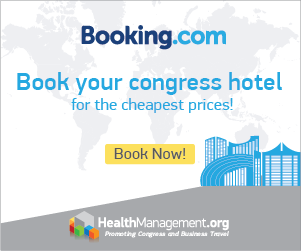Africa Health Business Symposium 2017

Start
Mon, 6 Nov 2017, 08:00
End
Tue, 7 Nov 2017, 05:00
Hashtag:
#AfricaHealthBiz #AHBS2017
Venue:
Exhibit
Symposia
Workshops
Organiser
Sponsor
Why Exhibit ?
Alongside the symposium, the event will offer exhibiting space which will be open to visit for both days of the event.
Exhibiting at the event will provide an excellent opportunity to promote your organisation, support your brand(s) and to maintain a high profile within the Health Industry before, during and after the event.
Benefits of Exhibiting
- High visibility
- Surrounded by extensive networking opportunities
- Building links with the leaders in primary health care delivery
- Associated with quality, innovation and excellence through an event with a reputation for addressing cutting edge issues
- Opportunity to showcase your products and services
WHY IS THIS PLATFORM FOR YOU?
STAY AHEAD OF THE CURVEGet insights on the industry trends and solutions to pertinent issues facing the continent.
FIND NEW WAYS OF THINKING AND PROBLEM-SOLVING
Deliberate on key issues common across the continent in the industry and anaylse simple solutions to make big differences.
STRENGTHEN YOUR SKILLS
Participate in side-sessions and special events to develop special skills sets.
NETWORKING OPPORTUNITIES
Interact with VIPs, industry champions and key decision makers to grow business opportunities.
Public-Private Partnerships (PPPs) have emerged over the last decade as one of the best ways to foster development, fueled by insufficient investment, growing pressures on government budgets and a general concern about service provision by state enterprises and agencies.
For more PPPs to emerge in Africa, countries need to improve the business environment. At present serious constraints exist in many countries. These constraints are: inadequate legal and regulatory framework for PPPs; lack of technical skills to manage PPP programs and projects; unfavorable investor perception of country risk, Africa’s limited role in global trade and investment, small market size, limited infrastructure and limited financial markets.
The benefits of PPPs are plentiful, especially when it comes to powering growth within sub-Saharan Africa. They spur investment in human development and help secure basic utility services. In the South African example, PPPs present opportunities for pro fessional development of project staff, encouraging knowledge and skills enhancement. Besides this vocational empowerment, PPPs serve the public’s interests by spurring capacity-building efforts and creating a sound environment for the vital build-up of strategic infrastructure. These benefits for a diverse group of stakeholders go hand-in-hand with the transfer of risk, both financial and operational.
Governments everywhere are grappling with rising healthcare costs and increased demand for healthcare services in the face of ongoing budget constraints. Healthcare providers must find innovative ways to generate revenue and these include PPP arrangements in Health. African governments struggle to stretch their healthcare funding and produce better results and are increasingly turning to PPPs with the private sector.
There are four key factors driving governments worldwide to use the PPP model for health sector improvements:
- Desire to improve operation of public health
services and facilities and to expand access to higher quality services
- Opportunity to leverage private investment for
the bene t of public services
- Desire to formalize arrangements with
non-profit partners who deliver an important share of public services
- More potential partners for governments as
private healthcare sector matures
The potential benefits of public funding and private delivery of health facilities and services are well-known, but the path from publicly-run hospitals to publicly- funded and privately-provided hospital services is not so well- known and can be challenging. There are different PPP arrangements in health that can be implemented, including the construction of health facilities, outsourcing non-clinical services including catering and cleaning services, as well as arrangements with private laboratories for the provision of capital intensive equipment or the outsourcing of the day to day hospital management to the private sector, among others.
The larger regional African health institutions, such as the West African Health Organization (WAHO) acknowledge that PPPs must be mutually beneficial and that the private sector entities must also have their objectives of achieving the goals the organization has set for itself.
With this backdrop, the second edition of the Africa Health Business Symposium (AHBS) will be a key platform to discuss “Transforming PPPs for Health in Africa”.
Who should attend
- Public sector health representatives
- Development partners
- Healthcare industry champions
- Keydecision makers
| Price | Qty* |
|---|---|
| Single Day - 6th November 2017 | $175.00 (USD) |
| Single Day - 7th November 2017 | $175.00 (USD) |
| 2 Days Entry | $250.00 (USD |
Healthcare demands in Africa are changing. Africa’s healthcare systems are at a turning point and the reforms that governments undertake over the next decade will be crucial in improving overall health in the continent.
A growing urban middle class is willing to pay for better treatment has opened the door to the private sector, which is starting to play a new vibrant role, often working in partnership with donors and governments to provide better healthcare facilities and increased access to medicine at an affordable price.Substantial investment will be needed to meet the growing demand – largely from low and middle-income households, which comprise 70% of Africa’s purchasing power.
The AHBS program covers the 5 key game changers identified that largely impact the healthcare industry across the continent:
- Healthcare Financing
- Human Resources for Health
- Fostering Investments
- Supply Chain Management
- Digital Technologies
Full Programme Details
Airport
The Léopold Sédar Senghor International Airport is less than 20 minutes’ drive from the hotel. Both taxis and car rental agencies are available at the airport, so you have several easy options for getting into the city. For more information please visit: https://www.aeroport-dakar.com/
Taxi
Taxis are the easiest way of getting around town. They are recognizable by their yellow and black colour. They do not have a taximeter and any ride outside Dakar must be negotiated with the driver before entering the vehicle. The official taxi rates for trips from Léopold Sédar Senghor International Airport are put up outside the airport. Don’t pay more. For more information please visit:
https://www.aeroport-dakar.com/taxis_location_vehicules_dakar.php#Taxis
Car rental
Car rental agencies represented at the airport include Hertz, National, Avis and Senegal Auto. For more information please visit: https://www.aeroport-dakar.com/taxis_car_rental_parking_dakar_airport.php
More events

Sat, 20 Apr 2024 - Sun, 21 Apr 2024

Mon, 22 Apr 2024 - Wed, 24 Apr 2024

Mon, 22 Apr 2024 - Tue, 23 Apr 2024

Tue, 23 Apr 2024 - Thu, 25 Apr 2024

Tue, 23 Apr 2024 - Thu, 25 Apr 2024

Wed, 24 Apr 2024 - Fri, 26 Apr 2024

Thu, 25 Apr 2024 - Sat, 27 Apr 2024

Fri, 26 Apr 2024 - Sat, 27 Apr 2024


Wed, 1 May 2024 - Fri, 3 May 2024


















